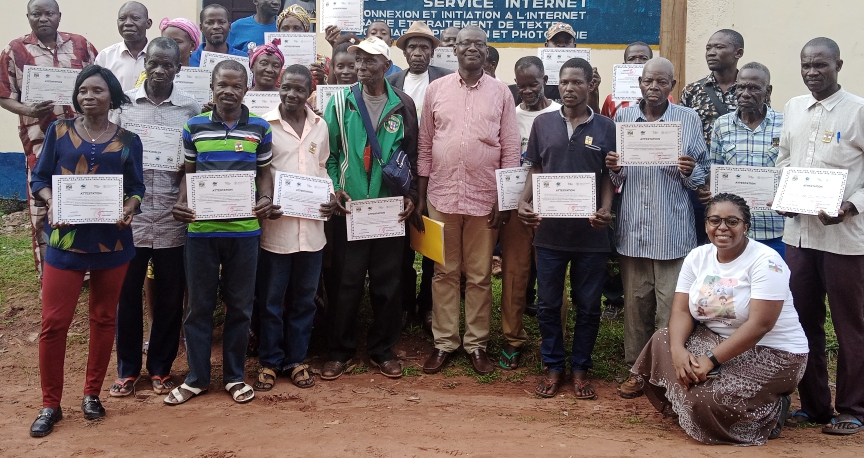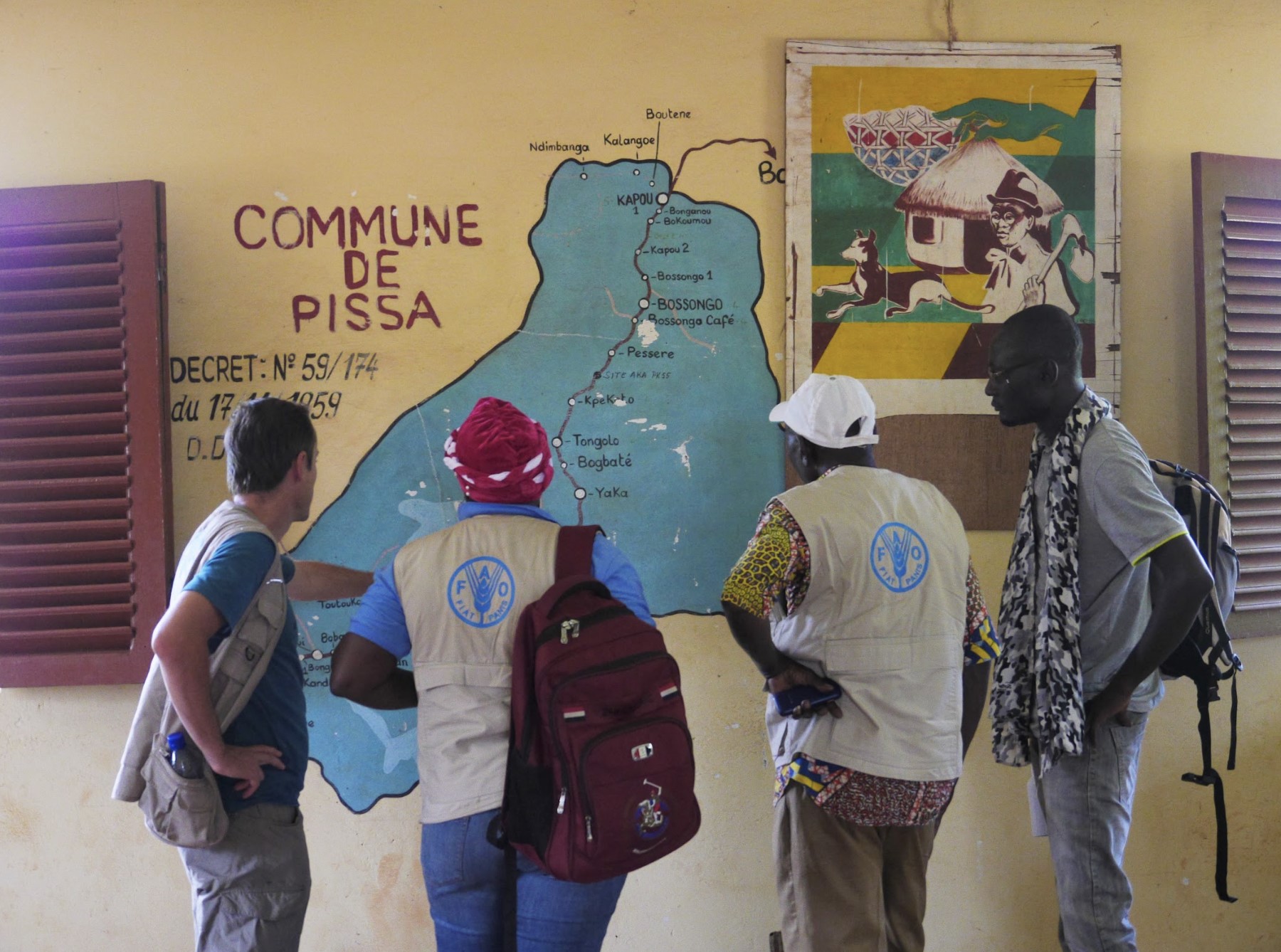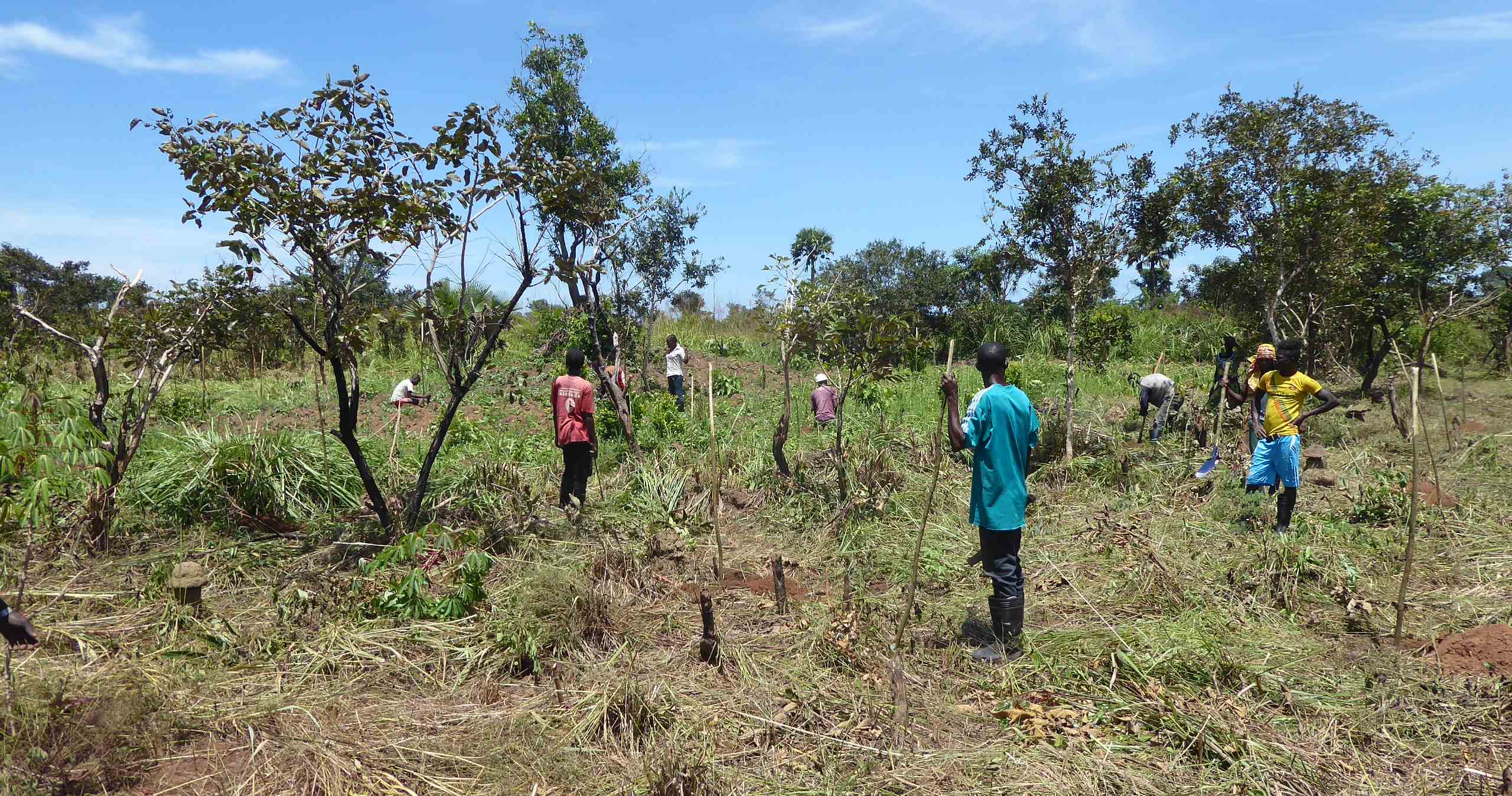Capacity building for the community forest allocation process in the Central African Republic
Contributions to the Bonn Challenge with the local communities of Pissa and Berberati.
The TRI project in the Central African Republic (CAR) is focused on the five subprefectures in the southwest of the country, which is mainly forest area, including the prefecture of Lobaye and the commune of Pissa.
In May 2020, the Boyama community asked FAO to support it through the process of establishing a community forest. The TRI project responded favourably to the request and has since begun supporting the people of Boyama in identifying and achieving a consensus among different stakeholders around establishing community forests in the Nguitto Forest (1 000 ha available). The project has also supported the development of a simple forest management plan with two major sections, including capacity building and support in putting together and submitting an application for the allocation of community forests. To this end, in August 2022, two training sessions on the process of identifying and allocating community forests were organized for 60 participants from the six villages in Pissa and Berberati, situated between Carnot and Nola. The training sessions focused on 12 modules, including:
- the definition of community forestry and related concepts;
- community forestry and Indigenous Peoples;
- the legislative framework for community forests;
- participatory development of the simple community forest management plan;
- allocation procedures, from informing communities to the official consultation meeting, community forest management standards, and monitoring;
- roles and responsibilities of stakeholders in supporting communities;
- lessons learned from the Cameroonian experience;
- gender and community forest management; and
- roles and responsibilities of stakeholders in support of local Indigenous Peoples.
To ensure sustainability, the process focused on raising awareness of the integration of several aspects related to natural resources in the process of allocating community forests, including identification, prevention and management of conflicts. The second training session in September 2022 supported the communities of Boyama in the development of their simple management plan, along with the drafting and submission of an application for the allocation of community forests to the subprefecture of M’Baïki in the prefecture of Lobaye, under the Forest Ministry Regional Directorate Number 1.
Basile Ndeya, the chief of Bombé village, shared, "The training helped us better understand our role as a “local community” in the community forest allocation process. The tools acquired during this training allowed us to make a valuable contribution to the development of the simple management plan for the Guitto Forest."
Albert Ndouba also agreed, stating: Before, I had no knowledge of our place and rights as Indigenous Peoples to the allocation of community forests. Thanks to this training, as a member of the Indigenous committee of the Guitto Community Forest, I feel empowered to sustainably manage and use forest resources.
 Trainees from Berberati session in August 2022.
Trainees from Berberati session in August 2022.Photo: FAO/Seigneur Yves Wilikoesse
Séraphin Wogasso, chief of Bongombé village in the commune of Pissa, said: It is with great joy that my community members and I welcome this TRI project and all the initiatives that go with it. Complementary initiatives such as income-generating activities will help us address the degradation of our forest resources, which for us are our only means of survival.
At the international level, International Labour Organization Convention 169 recognizes the right of Indigenous Peoples to self-determination within a nation state. Convention 169 is an instrument dedicated to improving the living conditions of Indigenous Peoples worldwide. The Central African Republic is the first African country to ratify the current convention, which the TRI project in CAR aligns with and prioritizes. As such, the principle of free, prior and informed consent (FPIC) is highlighted and integrated in project implementation activities in the field. Indigenous Peoples are present in Pissa and mostly in Bayanga, where they have been engaged in project formulation and ongoing activities in the field to restore and establish the Guitto Community Forest.
In terms of access to forest resources, Indigenous Peoples in the southwest of the country and Pissa in particular, are faced with three significant challenges:
- the overlapping of Indigenous Peoples’ territories and forest concessions, which limits their access to land and forest resources;
- a lack of community monitoring capacity for the sustainable management of natural resources; and
- the limitations (imposed by legal texts) on the protection of Indigenous Peoples in terms of access to land and forest resources.
By addressing the challenges faced by local communities, community forests contribute to improving local livelihoods, securing customary rights and enhancing the sustainable management of resources.
Aware of the challenges mentioned above, the TRI project aims to act at the operational level, starting with training and guiding populations in the process of community forest allocation. The project also acts strategically at the legislative level by building the enabling regulatory environment needed to promote community forests and the restoration of forests and landscapes. The annual budgeted workplan foresees efforts to support the revision of the forest code, as the next step toward this goal.
 Review of cartography within the Pissa community.
Photo: FAO/Seigneur Yves Wilikoesse
Review of cartography within the Pissa community.
Photo: FAO/Seigneur Yves Wilikoesse
These efforts constitute an essential contribution to achieving the Bonn Challenge, a commitment signed by CAR. Such work will continue, both on an operational and strategic level. Looking ahead to 2023, the TRI project in CAR will develop a training guide for communities on the process of community forest allocation, streamline management activities, clarify staffing requirements and collaborate with TRI projects across other countries and landscapes to glean lessons learned – all of which will continue to lead the project to success in CAR. Emphasizing the importance of each action leads TRI project partners, community members and the larger restoration community to better outcomes with CAR – including related community forest actions and legislative framework updates – and beyond.
This story is from TRI Year in Review 2022


